- Home
- Barry Eisler
The Detachment Page 3
The Detachment Read online
Page 3
I had a knife, a Benchmade folder, clipped inside my front pants pocket. But I would use it only for contingencies. Knives make a lot of mess, all of it laced with DNA. Guns, too, create an evidence trail. For sheer walk-awayedness, there’s really nothing like bare hands.
Past Saboru, the neighborhood grew more residential; the yellow streetlights, fewer and farther between. Within a block, the sparse clusters of pedestrians had evaporated entirely. Over the incessant background screech of cicadas I could just hear a set of footfalls from ten meters back. Coming, no doubt, from whichever of them was keeping me in visual contact. The secondary guy would be about the same distance behind the first, needing only to maintain visual contact with him. If they narrowed the gap between them, it would mean action was at hand. I wasn’t going to give them that chance.
There was a small parking lot on the left side of the intersection ahead. I had noted it on one of my periodic tactical explorations of the city’s terrain, and liked it because among a cluster of dim vending machines to its rear was the entrance to a series of alleys, more like crevices, really, leading back to the street we were walking on now. In fact, I’d just passed a gate that led from one of the alleys, though I doubted my pursuers would notice it, or, even if they did, would understand its current significance. From the sound of the lead guy’s distance behind me, I estimated that I could make it through the alley to the inside of the gate at about the same time the first guy would be pausing at the parking lot’s corner, trying to figure out where I’d gone, and the second guy would be passing the gate.
I made a left into the parking lot, and then, the instant I’d turned the corner, accelerated and turned left into the entrance to the alleys. Another left, past a row of garbage cans, and I was at the inside of the gate I’d just passed. I paused, my back to the wall, enveloped in darkness, and watched as the secondary guy passed my position. I waited several seconds before gripping the metal rail at the top of the gate and moving it back and forth to confirm solidity and soundlessness. Then I hopped up, eased my belly over, put a hand on each side, and rotated my legs around, landing catlike on the street side. There was the second guy, just a few meters ahead, approaching the edge of the parking lot. He was moving so slowly, it seemed he was aware his partner would have stopped just around the corner to look for me, and was trying to give him time. I wondered for an instant how he could have known his partner had paused—maybe just a sensible precaution when turning a corner?—but it didn’t matter. What mattered was that I was closing in on him, and that for the moment I had his back.
I traded stealth for speed, knowing I had only an instant before he might check behind him, and in fact as I reached him, he was just beginning to turn. But too late. I leaped into him, planting my left foot in the small of his back as though trying to climb a steep set of stairs. His body bowed violently forward and his head and arms flew back, and a startled grunt, loud enough, I was aware, for his partner to hear from around the corner, forced itself from his lungs. As he plunged to his knees, I wrapped my left arm around his neck, trapping his upturned face against my abdomen, secured my left wrist with my right hand, and arched savagely up and back. His neck snapped as easily as if it had been made of kindling, and with a similar sound. I let him go and he crumbled to the ground.
His partner appeared instantly from around the corner. He cried out, “Oh, fuck,” the vernacular, and the accent, I was distantly aware, both American, and lunged at me. I had no time to get out of the way, but neither the inclination. Instead, I held my position, extending my torso away from him so he was forced to reach for me, and twisted slightly counterclockwise as we came to grips. I extended my left leg, planted the sole of my foot against his right knee, grabbed both his biceps, and used his momentum to spin him counterclockwise in hiza-guruma. He was overbalanced and couldn’t get his legs out to correct because of the way I was blocking his knee. There was an instant of resistance, and then he was sailing past me, perpendicular to the ground, trying to twist away from me and turn his body toward the coming impact. But he was moving too fast for that now, and I was assisting his rapid descent, applying pressure to his shoulders to make them fall faster than his feet, wanting his cranium to bear the brunt. He hit the pavement with a thud I could feel as well as hear, his shoulders connecting first, then the back of his skull as his head snapped back. I dropped to my knees next to him but he wasn’t out, and even shocked and dazed as he must have been, he managed to turn into me and go for my eyes with his left hand. I grabbed his wrist with my left hand, slamming my elbow into his face on the way, snaked my right arm under his shoulder, secured my own left wrist, extended my body across his chest, and broke his elbow with ude-garami. He shrieked and tried to buck me loose. I scrambled back, reared up, and blasted a palm heel into his nose. The back of his head bounced into the pavement and I hit him again the same way. He rolled away from me, trying to get up, and I launched myself onto his back, throwing my left arm around his neck, catching my right bicep, planting my right hand against the back of his head, and strangling him with classic hadaka-jime. He struggled and thrashed and I kept an eye on his remaining good arm, in case he tried to access a concealed weapon. The choke was deep, though, and his brain was getting no oxygen. In a few seconds he was still and, a few more after that, gone.
I released my grip and came shakily to my feet, my heart hammering. I wiped sweat from my eyes with my sleeve and looked around. There had been that single scream, but I saw no one, at least not yet. Not likely either of them was carrying identification, but I felt I could afford a moment to check.
I knelt and pulled the guy I’d strangled onto his back. He rolled over with liquid ease, his broken arm flopping unnaturally to the pavement next to him. I patted his front pants pockets. A folding knife in the right. Something hard and rectangular in the left—a cell phone? I pulled it out and saw that it was a phone, as I’d hoped. But there was something else in the pocket. I reached back in and felt something metallic. I pulled whatever it was out and stared at it. It took me a moment to realize what I was holding: a small video camera.
Oh, shit.
A wire extended from the unit, disappearing beneath his clothes. I slipped my fingers between the buttons of his shirt and tore it open. The wire ran to one of the buttons. I leaned in—it wasn’t easy to see in the dim light—and looked more closely. Shit, it was no button at all, but a lens. And I was staring right into it.
I tore the wire free and stuffed the camera and phone into my pockets, then scrambled over to where the other guy lay. He was similarly equipped. I pocketed the second phone and camera, too, then walked off, keeping to the quiet streets paralleling Yasukuni-dori. I would take the batteries out of the phones to make sure they were untraceable and examine the cameras when I was safely away from the bodies. If the two giants had been using the equipment only to monitor each other, I would be okay.
But I had a feeling they weren’t just monitoring each other. And if I was right, I was in for another visit, and soon.
Larison stood just beyond the ambit of a streetlight, watching the silent images on the handheld video feed. One second, an empty street; the next, a crazy montage of kaleidoscopic images: limbs/grimaces/a car/a building/the sky flashing past. Darkness. Then the sky again, and glimpses of Rain, apparently going through Beckley’s pockets. Rain’s face in close-up, peering with dawning recognition directly into the button lens on Beckley’s cooling torso. A flash of static, then, finally, darkness.
He heard rapid footfalls from the direction of the Jinbocho subway station and looked up to see Treven come tearing around the corner. Larison pocketed the video monitor and stepped into the street with his arms forward, palms out.
“Stop,” he said. “It’s already over.”
Treven slowed, his face registering confusion. Probably he’d been expecting Larison to be riding to the rescue, too, no matter how futile a rescue attempt would be at this point. Meaning he hadn’t absorbed what Larison had told him
about the contractors not being part of the team.
“Go!” Treven said, moving to go around. “Didn’t you see the video? Rain ambushed them!”
Larison moved with him and shoved him back. Treven’s face darkened and he dropped his weight like a bull about to charge.
Larison held up his hands again. “Don’t make a scene,” he said. “There’s nothing we can do. They’re already dead.”
“We don’t know that. Rain’s gone, okay, but—”
“They. Are. Dead.”
Treven straightened and some of the tension went out of his body. “What about the cell phones?” he said. “The equipment. We need to retrieve it.”
“Rain took it all.”
“How the hell do you—”
“Wouldn’t you have? But it doesn’t matter. I watched him, over the video feed. He took the equipment and he’s gone.”
Treven watched him silently for a moment. Then he said, “You were close enough. You could have done something, if you’d wanted to.”
Larison glanced at the street behind him, then back at Treven. In some ways, he sympathized with Treven, who Larison understood was grappling with his recent first contact with the real world in the same way Larison once had. On the other hand, he didn’t care for Treven’s stubborn patriotism, which he found sanctimonious and naïve. And he hated that Treven knew his secret, having discovered Nico, Larison’s other life, when he’d tracked Larison to Costa Rica, looking for the torture tapes Larison had stolen.
“You manipulated them,” Treven said. “All that talk about taking the point…you goaded them. Because you knew what would happen.”
Larison shrugged. “What did I owe them? They were sent over here to spy on me. On both of us.”
Treven’s expression was incredulous bordering on disgusted. “They were Americans.”
Larison blew out a long breath. The contractors had been a hindrance, and he had gotten rid of them. It was no more complicated than that. He tried to remember a time when such a thing would have been a problem, when he might have paused beforehand and maybe even felt a pang of conscience after. He couldn’t. It had been too long ago, and too much had happened since.
“What does that have to do with anything?” he said.
Treven shook his head. “You’re a burnout.”
Larison didn’t respond. He didn’t know what to do. Kill Treven? But he needed him to get to Hort, and anyway Hort knew about Nico, too.
But once Hort was dead…
Once Hort was dead, the only person who would even know Larison was alive, let alone about his other life, would be Treven. Plus Rain, soon enough, and this other guy they were supposed to find. Larison needed them for now, he knew that. But once Hort was dead, all they’d represent would be downside.
Use the others to finish Hort, then finish them, too. Walk away with the diamonds, and silence everyone who posed a threat.
It was perfect. It could be done. All he had to do was bait the hook. The rest would take care of itself.
He tried not to smile. “Let’s just call Rain,” he said.
I had nearly reached Ogawamachi subway station, where I would catch a train and examine the items I’d taken from the two dead men, when one of their phones vibrated. I stopped and checked the readout—just a number, no name.
I looked around at the bustling street scene, cars crawling, pedestrians hurrying past me, the sky dark now, the area lit only by streetlights and headlights and storefronts. I pressed the “receive call” key, held the unit to my ear, and listened.
A low voice, almost a whisper, said in American-accented English, “I know who you are. Don’t worry, I won’t say your name on an open line. You took the phones you’re carrying from the two men I was with. It’s okay. I know they don’t need phones anymore.”
The natural question was, Who is this? I ignored it because of its likely futility, in favor of something more relevant.
“What do you want?”
“To meet you. I have a message from a fan.”
“Tell me over the phone.”
“No. If this is going to work, we’ll need to establish our bona fides.”
“Who’s ‘we’?”
“My partner and me.”
“Two messengers?”
“There were four originally, but yes.”
I paused, thinking about the video camera, trying to get my mind around what the hell this could be about. The evening was still sultry and I realized my shirt was soaked with sweat.
“Look,” the voice said, “I wasn’t any more enamored of the two guys you just met than you were. If I had been, I wouldn’t have encouraged them to get so close. I sent them inside twice. I knew you’d see them.”
I wondered whether that was bullshit. But the timing of the call and the calm confidence of the voice suggested I was talking to someone who’d foreseen this, even planned it.
“It’s up to you,” the voice said. “But I have something you’ll want. A unit that was receiving from the two you’re carrying now. Take your time examining them, you’ll see I’m telling the truth. Then, if you want the one I’m holding, we can meet.”
I considered proposing a creative rectal use for the unit he claimed to be carrying, but decided against it. The calculus was the same as for the two giants. I could face this now, tonight, or I could spend the rest of my days wondering who was after me, what they wanted, how far they were willing to go. And let whoever it was answer my questions at a time and in a manner of their choosing, not mine.
“Where are you right now?” I asked.
“If you’re still on foot, we can’t be more than a half mile apart.”
“There’s a coffee shop near the subway station I came out of. I’m assuming you were somewhere behind the two who followed me out?”
“That’s right.”
“You passed it ten seconds after you hit the street. Big yellow sign, distinctive frontage. On the right coming around from the station.”
I clicked off and pulled the batteries from the phones and the video cameras. The timing wasn’t great—if they’d been behind me the whole time, they were closer to Saboru than I was. I would have preferred to get there first and watch from the street. But there would have been disadvantages in proposing someplace farther away, too. First, I would have had to give explicit rather than oblique instructions over the phone. Second, they would have had more to time to set something up, if that’s what this was about. Overall, I judged my chances best if I could keep them on a short clock.
It took me less than ten minutes to get back to Saboru. I made two circuits, the first wide, the second passing directly in front. Sepia lights glowed in the windows but the bamboo plantings made it impossible to see inside. I stood at the dim corner of the street for a moment, looking left and right, considering. The cicadas had gone temporarily quiet, and the only sound was of the suzumushi—bell crickets—Saboru’s centenarian proprietor keeps in a cage by the entrance because he finds their evening music pleasing. I saw no Caucasians and nothing seemed out of place. My guess was, whoever had called me was already inside.
I walked over and went in, my gaze sweeping the softly lit interior. A young hostess offered to seat me and I told her as I continued to check tables no thank you, I expected my friends were already here. The ground floor was about half-filled with an ordinary assortment of after-work sarariman types and loafing college students. There was a quiet background murmur of conversation mixed with J-pop music emanating from speakers affixed to the corners of the low ceiling. No foreigners, nothing out of place. I took the wooden stairs to the second floor. Again, nothing. Then to the basement, squatting as I descended the stairs to get a view of what I was up against before I’d gone all the way down.
I spotted them immediately, in a corner booth, their backs to the brick wall, both big and fit-looking. One, in his thirties, with blond hair and a strong jaw, quintessentially American; the other, about a decade older, with shorter, dark hair and darke
r skin, harder to place. I wondered which had spoken to me and for some reason sensed it was the darker one. There was something dangerous-looking about him, an explosive quality I could feel from across the room even though he was sitting perfectly still. Their hands were open, resting on the pitted wooden table. A good sign, or at least the absence of a bad one. They kept still and watched me, their steady gaze the only indication there was any connection between us.
I kept moving, sweeping the cave-like room with my eyes, confirming there was no one else here who looked like he didn’t belong. There was another table open in the opposite corner. I inclined my head toward it to indicate they should follow, walked over, and stood by the bench with my back to the wall. I didn’t want to sit in the spot they had chosen, or to offer them a view of the stairs while I was denied it. And I wanted to have a chance to see them head to toe, to watch how they moved, as they had just done me.
They got up and walked slowly over, no sudden movements, keeping their hands clearly visible. We all sat down wordlessly and watched each other for a moment. A waitress came by and handed us menus, which were in Japanese. The darker guy glanced at his, then looked at me with the trace of a smile. “What do you recommend?”
I’d been right: the same quiet, raspy voice I’d heard on the phone. “I hear the house coffee is good,” I said.

 All the Devils
All the Devils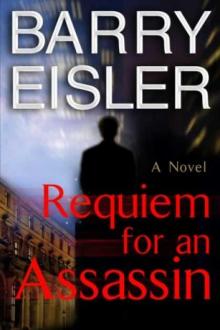 Requiem for an Assassin
Requiem for an Assassin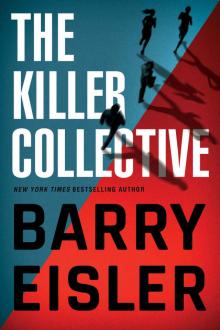 The Killer Collective
The Killer Collective The Chaos Kind
The Chaos Kind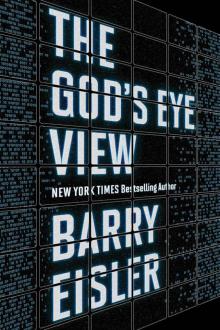 The God's Eye View
The God's Eye View Paris is a Bitch
Paris is a Bitch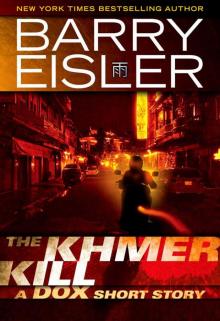 The Khmer Kill: A Dox Short Story (Kindle Single)
The Khmer Kill: A Dox Short Story (Kindle Single)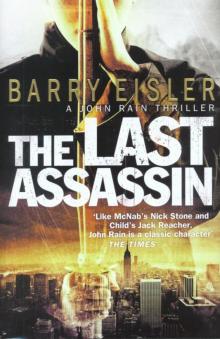 The Last Assassin
The Last Assassin The Detachment
The Detachment The Night Trade (A Livia Lone Novel Book 2)
The Night Trade (A Livia Lone Novel Book 2)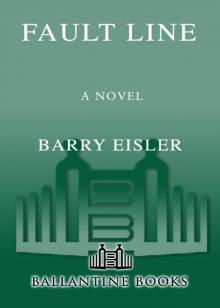 Fault Line
Fault Line Hard Rain
Hard Rain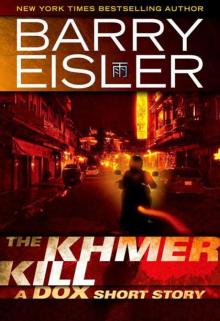 The Khmer Kill_A Dox Short Story
The Khmer Kill_A Dox Short Story London Twist: A Delilah Novella
London Twist: A Delilah Novella The Lost Coast
The Lost Coast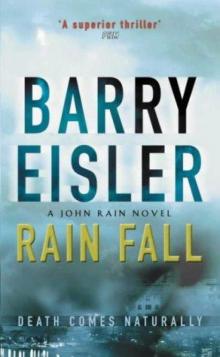 Rain Fall
Rain Fall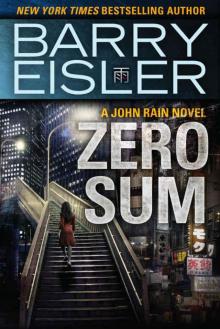 Zero Sum
Zero Sum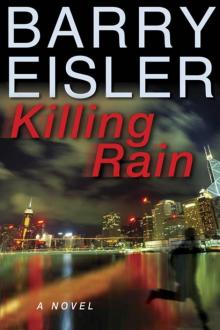 Killing Rain
Killing Rain John Rain 08: Graveyard of Memories
John Rain 08: Graveyard of Memories A Clean Kill in Tokyo (previously published as Rain Fall)
A Clean Kill in Tokyo (previously published as Rain Fall) Inside Out: A novel
Inside Out: A novel John Rain 07 - The Detachment
John Rain 07 - The Detachment Graveyard of Memories
Graveyard of Memories The Lost Coast -- A Larison Short Story
The Lost Coast -- A Larison Short Story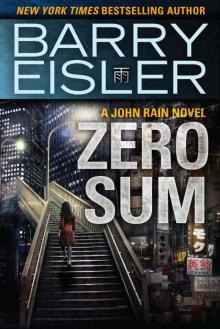 Zero Sum (A John Rain Novel)
Zero Sum (A John Rain Novel)